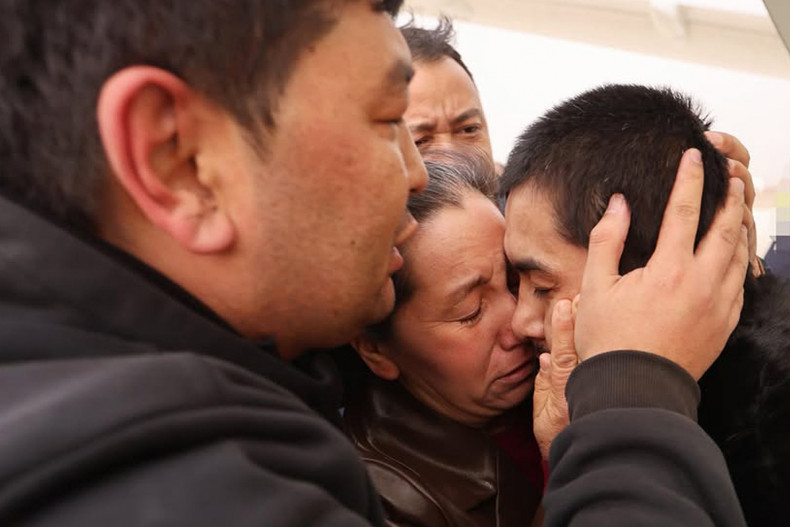The Chinese Embassy in Bangkok released this image apparently showing a Uyghur man being reunited with his family after being deported from Thailand. (Chinese Embassy Bangkok)
Diplomatic relations between the United States, Thailand, and China have been strained following the forced deportation of Uyghur refugees from Thailand to China in late February 2025. The U.S. Secretary of State, Marco Rubio, announced visa restrictions on Thai officials involved in the deportation, while the European Parliament passed a resolution condemning Thailand's actions. This news comes as Thailand’s government faces further scrutiny, including its previous deportation of 109 Uyghurs to China in 2015, whose fate remains unknown.
U.S. Sanctions on Thailand Over Uyghur Deportations
On March 14, 2025, U.S. Secretary of State Marco Rubio announced new visa restrictions aimed at Thai government officials responsible for or complicit in the forced return of 40 Uyghurs from Thailand to China on February 27, 2025. Rubio's statement emphasized the grave risks faced by the deported Uyghurs in China, including torture and enforced disappearances. He called on global governments to refrain from returning Uyghurs and other persecuted groups to China, where they face severe human rights violations.
Thailand's Response: Assurances from China, Emphasis on Humanitarianism
In response to the U.S. sanctions, the Thai Foreign Ministry issued a statement on March 15, 2025, asserting that it had received assurances from the Chinese government regarding the safety of the deported Uyghurs. Thailand further emphasized its "long tradition of humanitarianism" and vowed to continue monitoring the welfare of the Uyghur refugees. The statement also reaffirmed Thailand’s commitment to its longstanding alliance with the U.S., based on mutual respect and shared strategic interests.
However, the Thai government's position has been challenged internationally.
European Parliament Condemns Thailand for Deportations
The European Parliament took a firm stance on the issue, passing a resolution on March 13, 2025, condemning Thailand for its actions. The resolution highlighted that Thailand had violated international law by deporting at least 40 Uyghur refugees to China, where they face arbitrary detention, torture, and other human rights abuses. The European Parliament also called for international pressure on Thailand to cease such deportations and criticized Thailand for not considering alternative safe resettlement options.
A Troubling History: 2015 Deportations and Ongoing Uncertainty
This is not the first time Thailand has deported Uyghur refugees to China. In 2015, the Thai government returned 109 Uyghurs to China, despite international calls to protect them. The fate of these Uyghurs remains unknown, raising concerns about Thailand’s role in facilitating China’s crackdowns on Uyghur communities.
The 2015 deportations were marked by a particularly brutal image: Chinese authorities reportedly forced Uyghurs to wear sacks over their heads during the deportation process, an act that highlighted the inhumane treatment they faced.
China's Soft Power: Using Deportations as Propaganda
This time, China has taken a different approach, using "soft power" tactics to shape the narrative surrounding the deportations. Recently, Chinese state media released images of a Uyghur man reunited with his family, who had been separated during his forced return. These images were carefully staged to depict the Uyghur region as a safe place for the ethnic group, suggesting that conditions for Uyghurs have improved under Chinese rule.
This strategy can be seen as a propaganda tool aimed at promoting the image of a peaceful and prosperous Uyghur region, while downplaying ongoing reports of mass detentions, forced labor, and systematic repression. The Chinese government appears to be trying to mask the reality of the human rights abuses Uyghurs continue to endure by using carefully curated visuals to manipulate international perceptions.
Conclusion: Diplomatic Fallout and Human Rights Concerns
As the U.S. and the European Parliament continue to apply diplomatic pressure on Thailand over its role in the deportations, the situation remains tense. The international community’s focus on the plight of Uyghur refugees highlights the ongoing human rights concerns in China and the importance of ensuring that vulnerable groups are protected from forced returns to dangerous situations. Thailand's handling of this issue will likely have long-lasting implications for its international relations, particularly with the U.S. and European nations.
By Dilshat Sultan
15 March 2025

